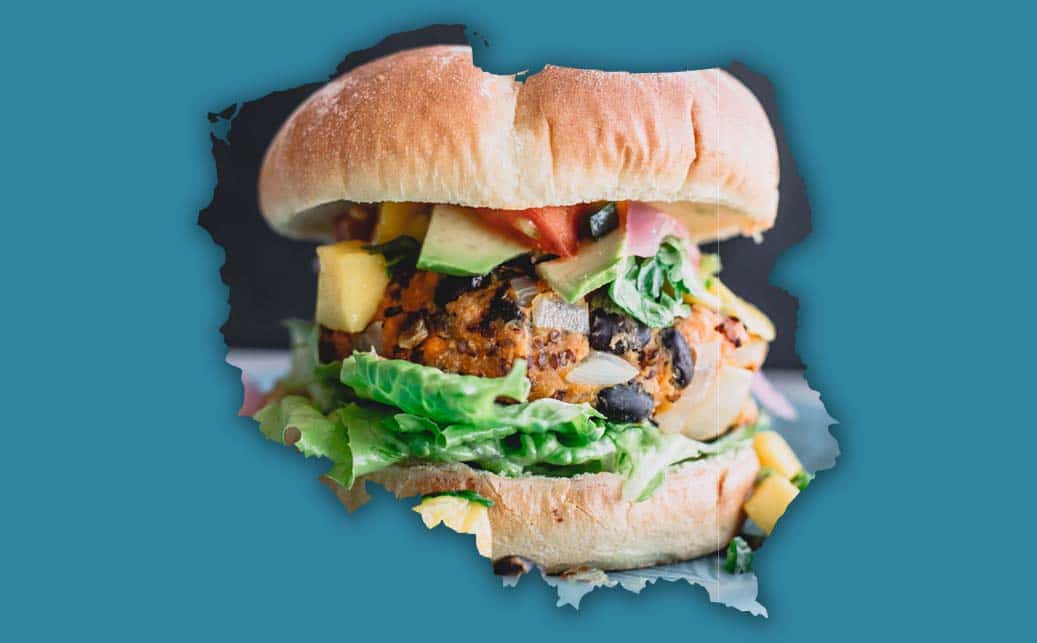Meanwhile, it is reality as kabanos are plant-based. This is more or less how social media looks from a Polish vegan’s perspective when a new plant-based product comes out. This was the case when Polish brand Tarczyński released vegan kabanos.
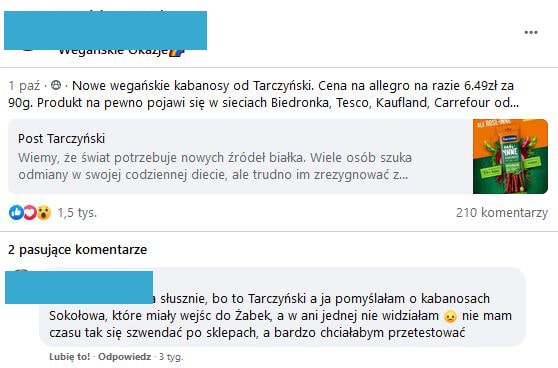
A post on one of the vegan Facebook groups about Tarczyński’s plant-based kabanos sausages. It was liked by 1,500 people. This is just one of many posts on the topic.
Out of curiosity I checked the company’s Facebook page. The average number of likes for the brand’s posts is about 100, while the post about vegetable kabanos was liked by 3,400 people. In addition, it had 1,000 comments and almost 500 shares.
Vegans are a very marketing-savvy group who share information about plant-based products. Some of the posts on this topic have a reach that some companies can only dream about on their social media.
The post on the RoślinnieJemy campaign profile about Polish brand Społem Kielce mayonnaise was liked by more than 4,000 people.
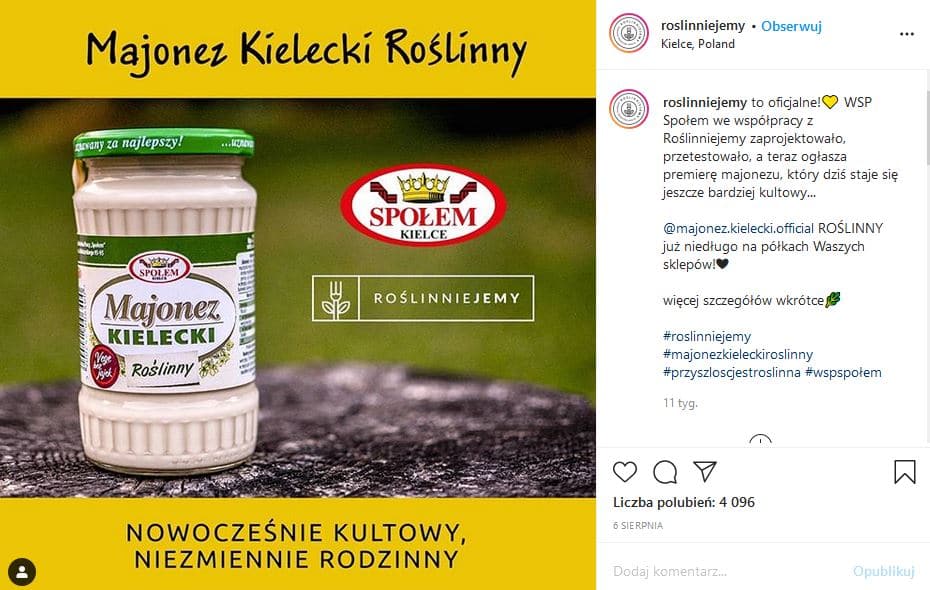
The post on the RoślinnieJemy campaign profile about Społem Kielce mayonnaise was liked by more than 4,000 people.
Most people twenty years ago did not know what veganism was.
Today, it doesn’t often need to be explained. The world’s largest companies are racing to release plant-based substitutes for common foods.
Is this a fad? No, research leaves no doubt that this is a growing trend.
Many celebrities are extolling the virtues of a plant-based diet, including foreign stars such as Moby, Joaquin Phoenix, Peter Dinklage, and James Cameron, to name just a few, as well as Polish stars such as Julia Kamińska, Agata Buzek and Karolina Pilarczyk.
Warsaw has catered to vegans for a long time. The HappyCow website listed it as the seventh most vegan-friendly city in the world, followed by London in first place and Berlin in second.[1]
In this article, I analyze how the Polish vegan market evolved and give some interesting examples.
In addition to the examples of advertising campaigns presented in the article, I’ve collected 20 creative and distinctive advertising campaigns for vegan products in a free e-book. You can download it by subscribing to our newsletter.
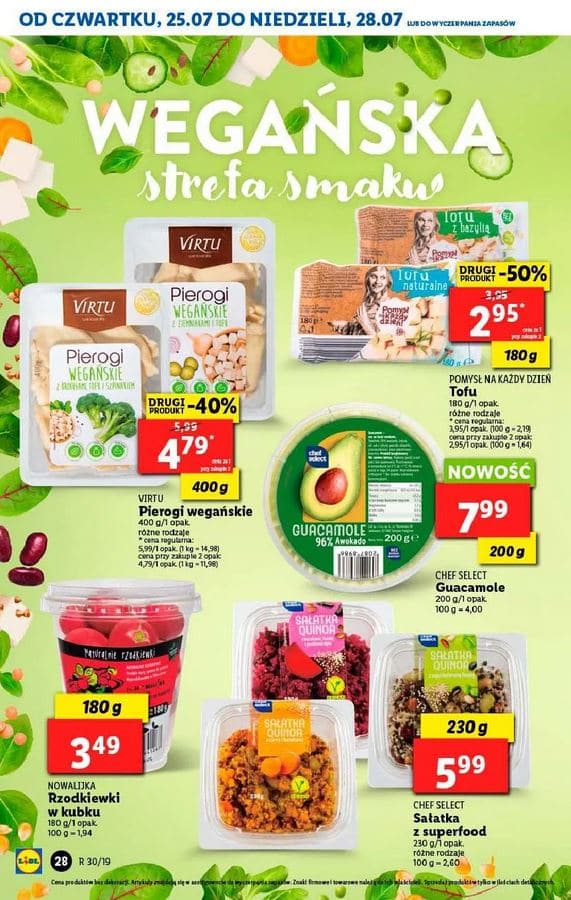
The growing popularity of vegan products can be seen in supermarkets.
This is a page from Lidl’s pamphlet.
Polish people open to new flavors
– Over the past 1.5 years, we’ve talked to dozens of meat, dairy and other producers in Poland. The first problem we see is the lack of information. Just two years ago, 90 percent of such companies did not know that Beyond Meat had gone public in the US, and that it was their competition – says Piotr Grabowski, co-founder of foodtech.ac.
– How does the Polish producer think? “Some veganism there, some substitutions there, but how much of it will be our production?”. Until they feel that the competition is catching up, they won’t start on their own. They don’t believe that maybe it’s a good business and they don’t bother with it. They also fail to see that today a foreign company can conquer the market quickly. They enter Poland with a higher marketing budget and flood the market with products and there is nothing left to collect – adds Grabowski.
A risky investment? Not if you look at the statistics.
According to the Central Statistical Office, meat consumption in Poland is declining. In 2019. Poles ate 2.24% less meat compared to 2018.[2]
A survey conducted by Pyszne.pl shows that there are 1 million vegans and vegetarians in Poland, and 2 million people are considering a meatless way of eating.[3]
At the same time, more and more stores are releasing plant-based products, including drinks, tofu and vegan meats substitutes. Why? Because it’s paying off.
– Nielsen surveyed the Polish market for vegan products for the first time. The highest value was achieved by plant-based milks: 253 million PLN, ready meals such as vege burgers or falafels 107 million PLN and sandwich pastes 81 million PLN. All these products recorded double-digit growths of respectively: 30%, 16% and 23%. Such a trend has been visible for several years now. “It is influenced by the attitudes of consumers with increasingly affluent wallets, ready to spend more on groceries and looking for healthy products – says Bożena Rudaś, Business Development Senior Consultant at Nielsen Connect.[4]
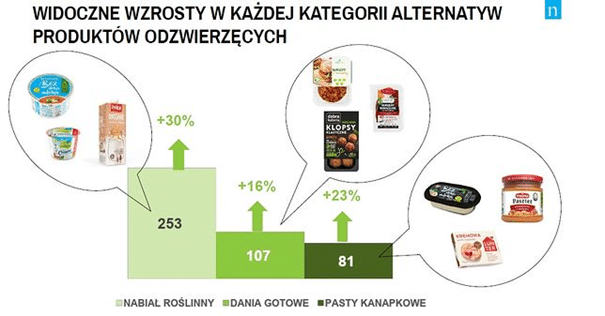
The popularity of vegan products in Poland is on the rise. Source: Nielsen Connect
– Innovation pays off. In large EU markets, such as the UK, Germany or France, a successful innovation is a product whose sales value in the first year exceeds 10 million euros — Karolina Zajdel-Pawlak, Managing Director of Nielsen Connect in Poland – The higher than regional average sales value results from the size of the market and the number of households, but it also shows the level of economic development of the country and the willingness of Polish people to try new products.[5]
The fact that it pays off, however, does not mean that Polish producers – at least the majority – realize this.
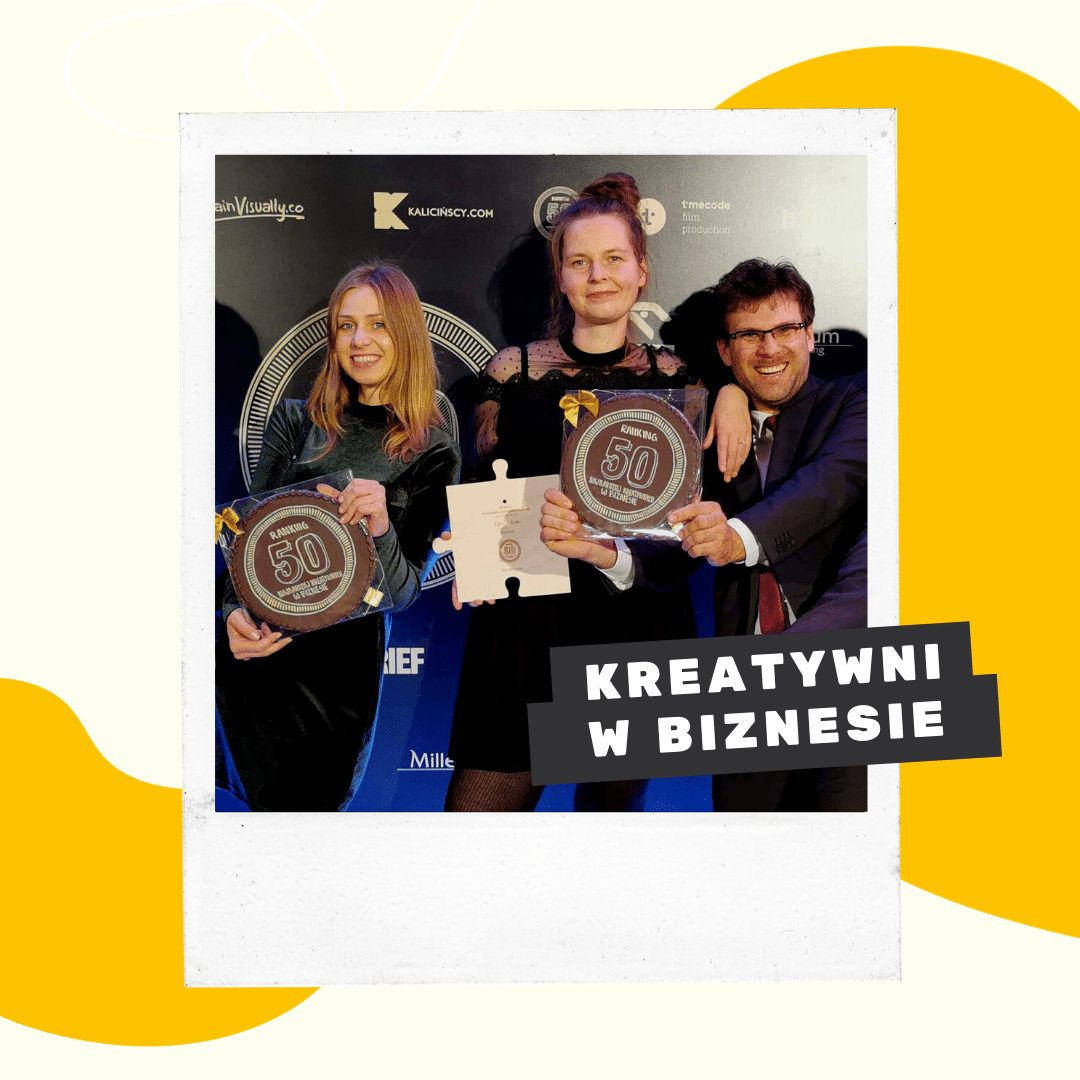
Qurczak, a Polish brand that produces a chicken meat substitute, was recognized by Brief magazine in its ranking of the 50 Most Creative People in Business. Source: Facebook Qurczak
Cooperation with organizations promoting veganism
I asked some of Poland’s largest organizations promoting a plant-based diet if and how they were affected by this trend.
– The involvement of the Polish food industry in plant-based products has changed dramatically over the past three years. From a downplayed and marginalized trend in the eyes of producers, it has become one of the main areas of interest. You can see it on store shelves, and also at industry events, where topics related to plant-based products are strongly emphasized – said Maciej Otrębski, strategic partnerships manager at RoślinnieJemy.
There is also a growing interest in certifying products suitable for vegans and vegetarians.
– I see an increase in interest and willingness to label products. I can safely say that in the Foundation, the year-over-year increase in certified products is about 100 percent – says Agnieszka Grzywaczewska, coordinator of the Znak V certificate, Viva! Poland.
– More and more new companies are signing up, including those not involved in plant production on a daily basis. Examples include dairies such as MSM (Mazowiecka Spółdzielnia Mleczarska), Polmlek Group, and large meat processing plants, which are beginning to see a future in plant production. A great example here is the recent certification of Tarczyński’s vegetable kabanos – says Przemysław Chojnicki, V-Label Poland certification director.
The meat industry itself has started to open up to the growing market of meat-free products. It not only has launched its lines of these products, but also taken part in conferences of pro-animal organizations. It has also invited its representatives as speakers at industry events. One of the experts at the Meat Congress ’20 was Maciej Otrębski from Roślinniejemy.
– What is interesting is that retail chains are introducing plant-based products under private labels. I would venture to say that we can talk about a market segment rather than a trend – said Otrębski during the Congress.[6]
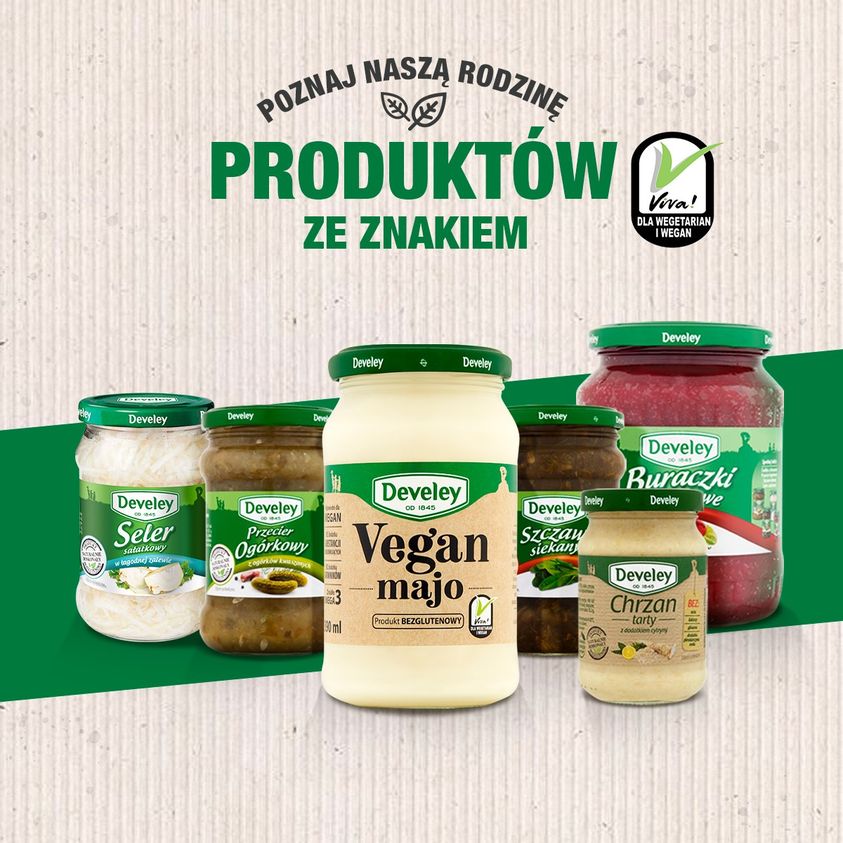
More and more companies are choosing to certify their products.
The dairy that switched 100 percent to plants
Jogurty Magda production facility has been operating in Poland for nearly 30 years. It is a family company located in Nowy Targ producing yogurts… from cow’s milk.
Everything changed when Magdalena Kubit, the company’s managing director, started a vegan revolution. The plant began producing plant-based yogurts using coconut milk.
– In preparation for Planton, we undertook extensive market research. We tasted dozens of products from all over Europe and set the bar very high for ourselves. The product by definition had to be delicious and not only aimed at vegans – says Magdalena Kubit.[12]
In 2017, the company had a revenue of 5 million PLN. It started with the production of vegan yogurts at the end of 2017. In 2018, it had PLN 12.4 million in revenue.
The demand for the product was so high that the plant completely switched to vegan production. It is the first Polish dairy to produce only plant-based products.[13]
Ethics are at a premium
While some companies avoid as much as possible wording relating to a vegan diet, others go head-to-head with the topic. And, contrary to the research cited above, they’re doing just fine.
The first example: a spot for Dobra Kaloria, a Polish company producing vegetable bars, vegan burgers, vegan sausages and other vegan products.
The company puts a lot of emphasis on ethical considerations in the commercial. We hear that “the burger does not contain animals, of course and the tears of your grandson, whose planet was destroyed”. And all in a slightly humorous tone, delivered in a visually appealing form.
Why does this advertisement work?
I think it is a matter of consumers’ readiness for such a message. Dobra Kaloria has been around for almost 30 years. I remember during a conference organized by ProVeg, Dorota Kubara, co-owner of the brand, said that many years ago the brand tried to launch products dedicated to vegans and vegetarians.
At that time, however, it did not succeed. The market, and with it the customer, had to mature for it. This time, the company timed itself perfectly with its product.
This also shows that as customers become more accustomed to veganism brands will be able to be bolder in their messaging.
The power of association
Some companies deliberately compare their products to their non-vegan counterparts. Statements are made such as: familiar form, but better taste; great taste, but without animal suffering; and healthier version, better quality.
An interesting example is the Alpro Soya brand campaign. The advertising of plant-based drinks and yogurts refers to the well-known advertising slogan “drink milk, you will be great”. On the brand ads we read: “You are great”.
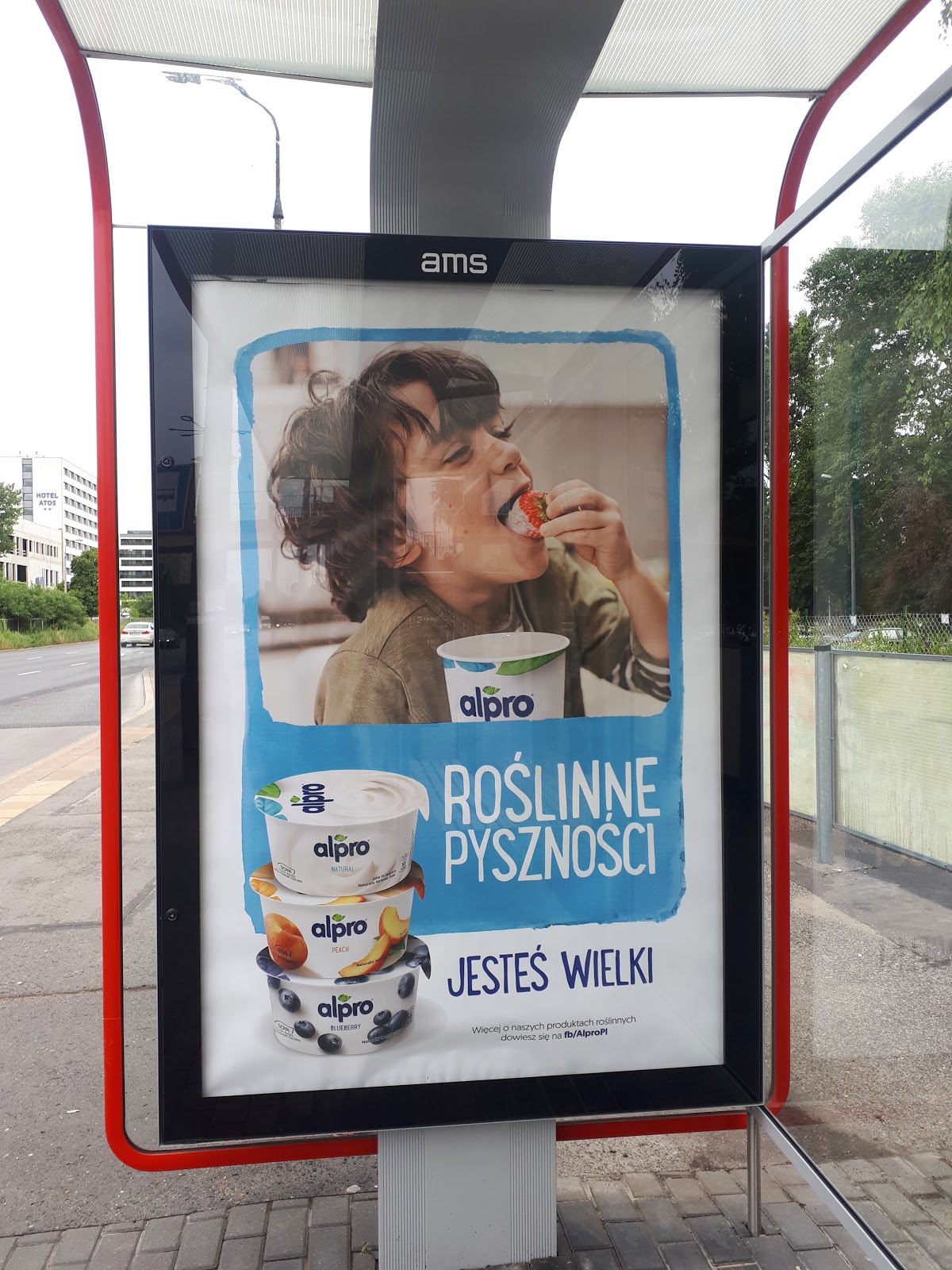
The company remained unmoved by the requests of the then not so large group of consumers.
Today, its yogurts can be found in most major retail chains.
Shelf placement in stores
The place for vegan products is in … well, exactly where?
– Vegan food producers began to demand to be positioned as equals in the store. Their marginalization in the bio/eco zone was not good. It divided customers. We are not attacking 10 percent of the vegan/vegetarian market. We are attacking 100 percent of the market and we aim primarily at flexitarians, people who want to limit their meat consumption – says Piotr Grabowski.
– Thanks to the fact that we stood in the company of meat, we reached a completely new audience, and these are customers who would never in their lives approach a shelf with hummus. These are just people who went to Lidl or Kaufland to buy a sausage for the barbecue, and their hand probably trembled and they took those meatballs or a burger. We started to get very nice feedback from people who had never had contact with plant-based products before. – said Karolina Kubara (Dobra Kaloria) at the 2019 Plant-Powered Perspectives conference.[26]
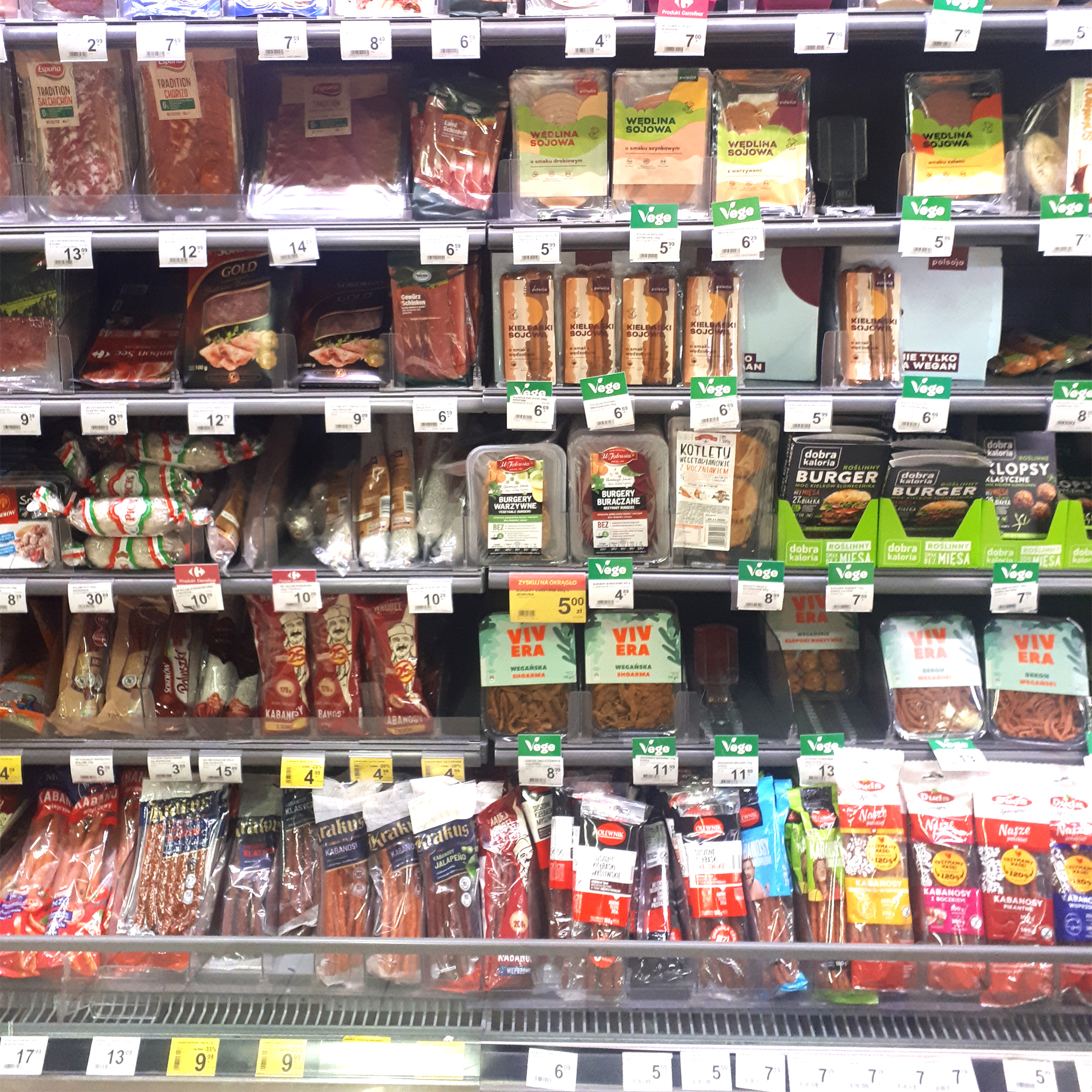
A shelf in a meat section in a supermarket with vegan meat substitutes
Trends
What does the future hold? Certainly even more plant-based products taking Polish food stores by storm.
– Retail chains are actively looking for new vegan products. They want them on their shelves. It used to be that you would go to a merchant and the merchant would say: “people don’t know it, small margin, it’s some kind of novelty, I’ll just take some”. Today the merchant says: “give us more, do you have any interesting projects? what will appear in six months, what in a year?”. Now we’re accelerating a team developing a brand of bean-based vegan yogurt, Cool Beans. The girls have actually only shown the product at the Plant-Powered Perspectives conference this year, and people are already reaching out to us with questions about it – says Piotr Grabowski.
This is also confirmed by Polish organizations dedicated to promoting a plant-based diet. When asked “what collaboration has surprised you the most?”, Przemyslaw Chojnicki replied:
– We are no longer surprised by cosmetics, clothing or furniture. However, there are sometimes seemingly very exotic applications. One example is the certification of firefighter helmets, which we dealt with last year. This shows how much demand we are starting to see in the world for vegan products.
Educating the Polish market about veg products with ExplainVisually
On the one hand, we want to reach vegans and vegetarians, and on the other hand, we want to reach other consumer groups.
I don’t want this to sound directly like an advertisement, because I really believe in what I write….
I believe that we at ExplainVisually can help vegan food producers.
Over the past years, we’ve repeatedly told stories about new applications, industrial IT systems, or restructuring at a rocket engine factory in simple terms. We have created animations, presentations, infographics and websites for startups and corporations such as IKEA, Orange and TAURON.
That’s why we know the topic of market education inside out.
The topic of plant-based nutrition is close to my heart. I have been involved in the promotion of a plant-based diet for several years and have worked with many companies, with publishing a magazine about the vegan diet, organizing lectures, workshops and trade fairs.
I know how to talk about vegan products and, above all, I understand them.
Besides that, we know Polish consumers.
Research shows explainer videos are a great way to reach customers.Explainer videos allow you to stand out.
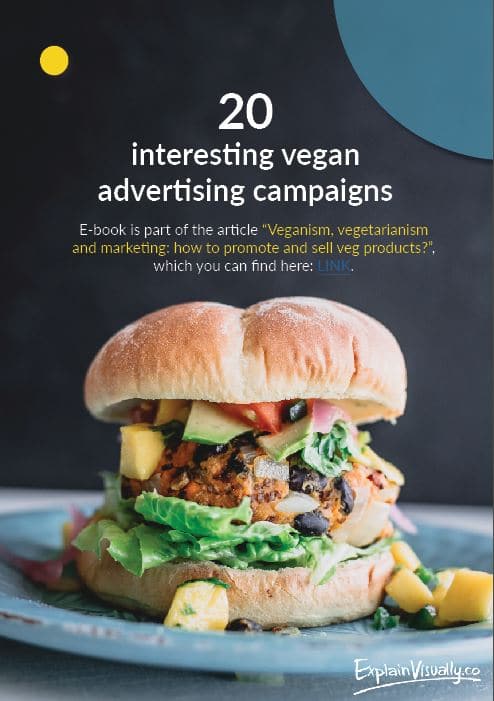
You can download the free e-book “20 interesting vegan advertising campaigns” by subscribing to our newsletter
If you want to learn more about how we can help you and your product, contact us.

She studied Japanese and linguistics at the University of Warsaw, but it was her work for an NGO, first as a volunteer, and then professionally, that shaped her interests. As a coordinator of one of the campaigns she organized conferences, meetings at the Parliament, fashion shows, made interviews with politicians and celebrities. She also took care of social media and marketing. Now she is responsible for marketing and running social media at ExplainVisually.
Bibliography
[1] Warszawa wśród 10 najbardziej przyjaznych weganom miast na świecie: https://www.focus.pl/artykul/10-najbardziej-przyjaznych-weganom-miast-na-swiecie-wsrod-nich-warszawa
[2] Errata: Raport GUS – Przeciętne spożycie mięsa na osobę spadło w Polsce o 2,24% w 2019 roku: https://roslinniejemy.org/blog/gus-przecietne-spozycie-miesa-na-osobe-spadlo-w-polsce-o-20-w-2019-roku
[3] Polacy rezygnują z mięsa: https://archiwum.rp.pl/artykul/1413153-Polacy-rezygnuja-z-miesa.html
[4] Badanie Nielsen: Wege warte miliony: https://www.petrolnet.pl/badanie-nielsen-wege-warte-miliony/
[5] Hot dogi bez mięsa wielkim hitem: https://www.rp.pl/Przemysl-spozywczy/310279959-Hot-dogi-bez-miesa-wielkim-hitem.html
[6] Maciej Otrębski, RoślinnieJemy: zamienniki mięsa to już nie trend a segment rynku: https://www.wiadomoscihandlowe.pl/artykul/maciej-otrebski-roslinniejemy-zamienniki-miesa-to-juz-nie-trend-a-segment-rynku
[11] Greggs’ vegan sausage rolls fuel profit boom: https://www.theguardian.com/business/2019/may/14/greggs-vegan-sausage-rolls-fuel-profit-boom
[12] „Nie byłoby Plantonów bez prawie 30-letniego doświadczenia produkcji jogurtów mlecznych” – wywiad z Magdaleną Kubit: https://roslinniejemy.org/blog/nie-byloby-plantonow-bez-prawie-30-letniego-doswiadczenia-produkcji-jogurtow-mlecznych-wywiad-z-magdalena-kubit-ceo-firmy-jogurty-magda
[13] Jogurty Magda. Dobry biznes na jogurtach dla wegan: https://www.forbes.pl/biznes/jogurty-dla-wegan-polski-producent-jogurty-magda/xdmxy7w
[14] Magazyn „Vege” 3/2019
[15] Linda Bacon, Jonathan Wise, Sophie Attwood i Daniel Vennard, The Language of Sustainable Diets: A Field Study Exploring the Impact of Renaming Vegetarian Dishes on U.K. Café Menus, 2019
[16] The dos and don’ts of marketing plant-based foods: https://www.foodbusinessnews.net/articles/13280-the-dos-and-donts-of-marketing-plant-based-foods
[17] Unia Europejska zdecyduje, czy wegetariańskie burgery mogą być nazywane burgerami, skoro nie ma w nich mięsa: https://bezprawnik.pl/wegetarianskie-burgery-unia-europejska/
[18] „Mleko sojowe” i „masło roślinne” zakazane. Trybunał Sprawiedliwości na wojnie z weganami i podszywaniem się pod mięso: https://bezprawnik.pl/tsue-kontra-weganie/
[19] Wegeburger nie zostanie zakazany. Burzliwa debata o… bezmięsne parówki: https://www.msn.com/pl-pl/wiadomosci/polska/wegeburger-nie-zostanie-zakazany-burzliwa-debata-o%E2%80%A6-bezmi%C4%99sne-par%C3%B3wki/ar-BB1an00e
[20] Oatly: Another Swedish Success Story in China: https://www.marketingtochina.com/oatly-another-swedish-success-story-in-china/
[22] Impossible Burger’s ‘bleeding’ ingredient gets FDA approval: https://www.fooddive.com/news/impossible-burgers-bleeding-ingredient-gets-fda-approval/528577/
[23] Vegan Oatly Exceeds Sales Targets After ‘Like Milk But Made For Humans’ Campaign: https://plantbasednews.org/lifestyle/vegan-oatly-exceeds-sales-targets-after-campaign/
[24] KFC lures flexitarians and curious vegans with Imposter burger: https://www.campaignlive.co.uk/article/kfc-lures-flexitarians-curious-vegans-imposter-burger/1587562
[25] Should Vegan Products Be Sold Alongside Meat And Dairy Items In Retail Stores? https://www.forbes.com/sites/katrinafox/2018/05/07/should-vegan-products-be-sold-alongside-meat-and-dairy-items-in-retail-stores/#40e6f1ff3204
[26] #ppp2019: Karolina Kubara – Pół roku z roślinnymi burgerami: https://www.youtube.com/watch?v=V8Kpy4cmZ4w
[27] Abel Thomas , Roshan Deshmukh , Vegan Food Market by Product Type (Dairy Alternative, Meat Substitute and others) and Distribution Channel (Offline and Online): Global Opportunity Analysis and Industry Forecast, 2019-2026; 2019
[28] W 2019 roku weganizm wszedł do mainstreamu. Jak trend będzie ewoluował w tym roku? https://www.dlahandlu.pl/detal-hurt/wiadomosci/w-2019-roku-weganizm-wszedl-do-mainstreamu-jak-trend-bedzie-ewoluowal-w-tym-roku,84565.html

